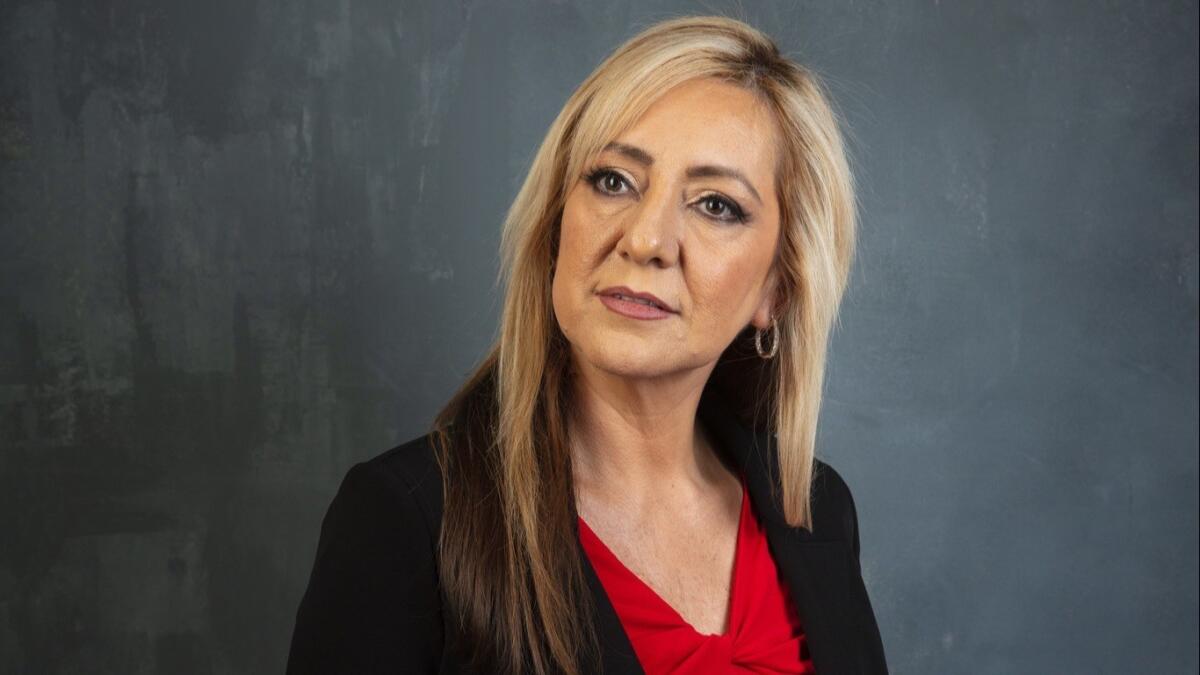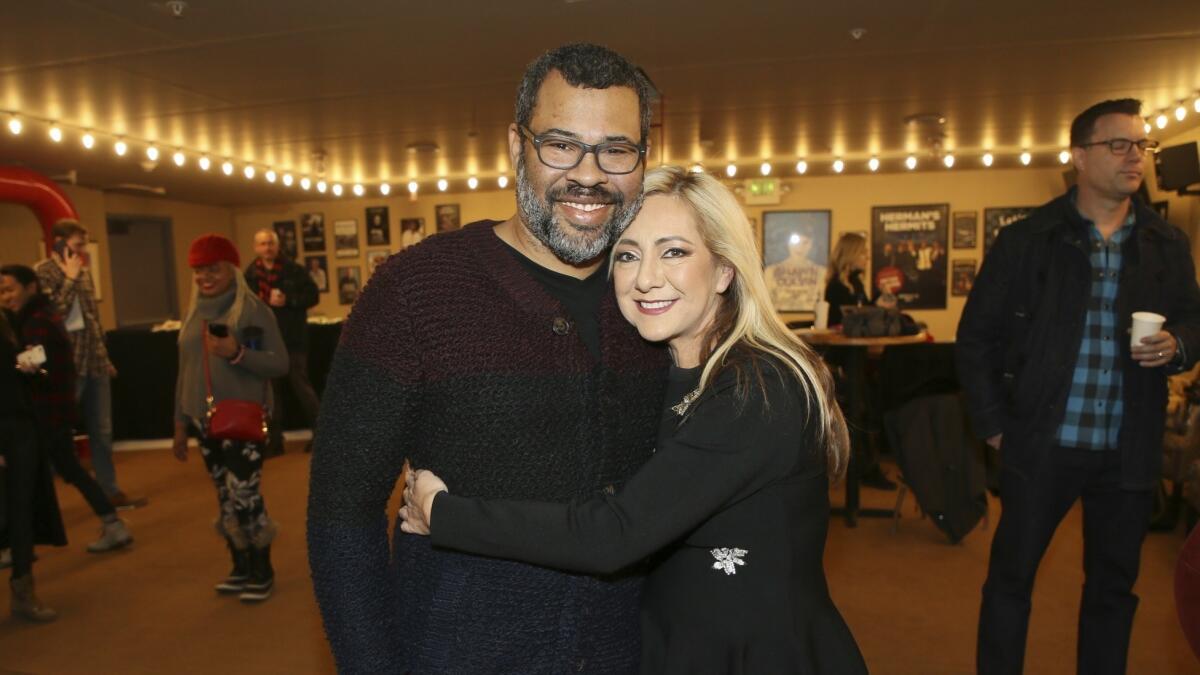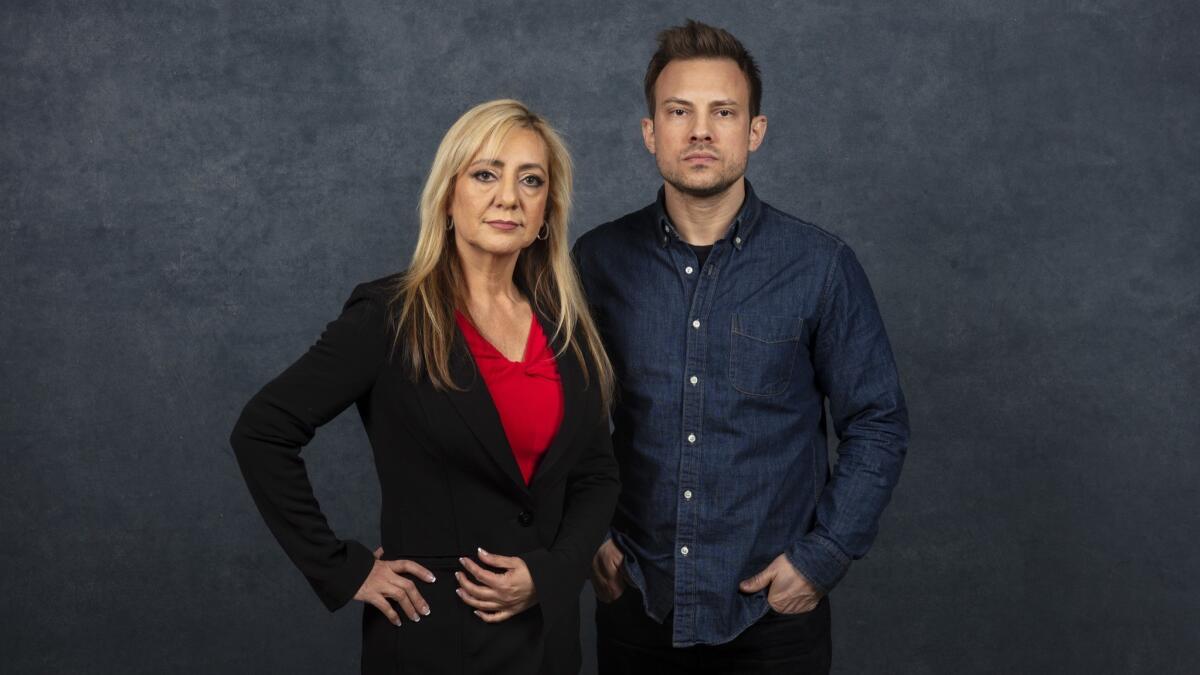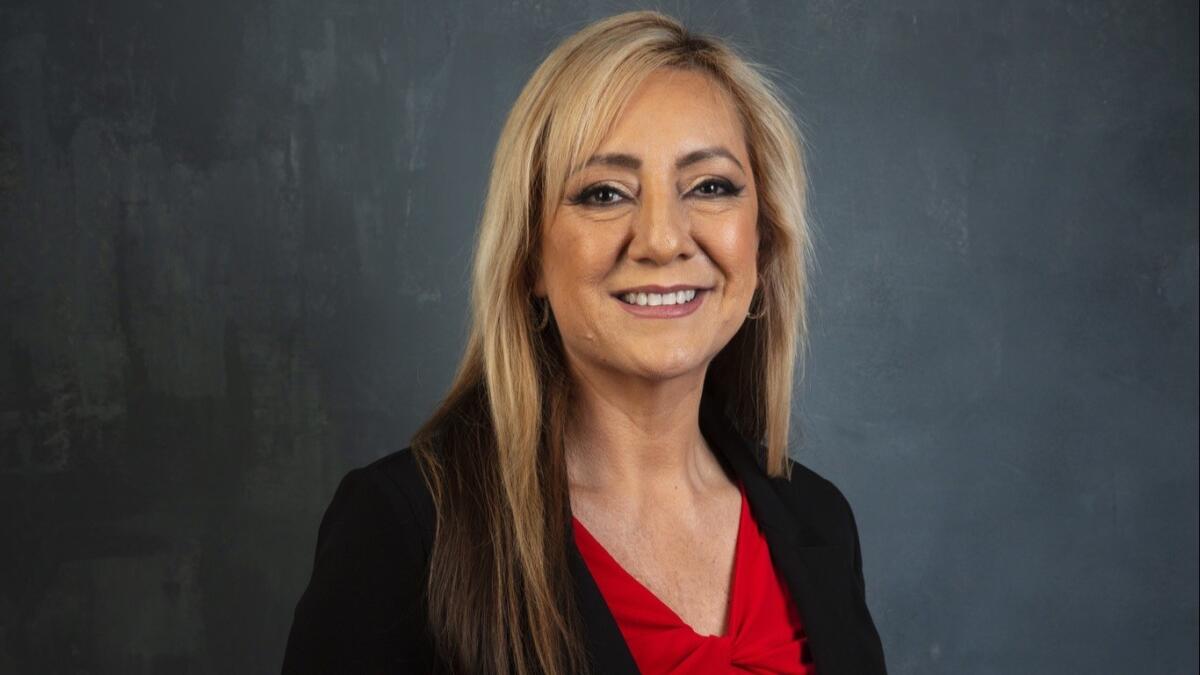Jordan Peele’s Lorena Bobbitt docu-series asks: Why did we vilify a domestic-abuse victim?

- Share via
Reporting from Park City, Utah — During her trip to the Sundance Film Festival, Lorena Bobbitt got the celebrity treatment. Black cars shuttled her around the snowy mountain town. A professional makeup artist was on-call for touch-ups during her on-camera interviews with major publications. And when she stood in front of a packed theater at the premiere of a new Amazon docu-series about her life, moviegoers eagerly held up their phones to snap photos of her.
But of all the glittery moments at the festival last month, there was one in particular she clung to: Kevin Smith apologized to her. Yes, that Kevin Smith — the one behind “Clerks” and “Chasing Amy” and “Jay & Silent Bob.” She met him during a stop at IMDb’s studio, where he was doing interviews on behalf of the website.
“And it totally caught me by surprise, but he apologized — he apologized on behalf of the whole country,” recalled Bobbitt, who now goes by her maiden name, Gallo. “I sensed that he got it, that this man absolutely understands. Men like him give me hope that someday we will find the equality we are seeking.”
After the four-part “Lorena” goes up on Amazon Prime Video on Friday, it’s likely Gallo may be fielding quite a number of mea culpas.
Executive produced by Jordan Peele, “Lorena” explores the 1993 case that dominated national headlines: Gallo, a 24-year-old Ecuadorian immigrant, cut off her husband John Wayne Bobbitt’s penis with a knife and tossed it in a field in Manassas, Va., before calling 911.
She said she’d long been a victim of domestic abuse and marital rape, and that night, after her husband came home drunk and allegedly raped her, she grabbed a knife from the kitchen and committed the act in a sort of stupor.
He said he was planning to divorce her and refused to have sex with her that night, so she waited until he was asleep to cut off his penis.
In January 1994, Gallo was found not guilty of all criminal charges, with a jury concluding she committed the act while temporarily insane. But as “Lorena” documents, the media largely ignored Gallo’s claims of abuse — many of which were backed up by neighbors and co-workers in court — and instead painted her as a man-hating witch.
Bobbitt, meanwhile, became a D-list celebrity fixture, starring in adult entertainment videos — yep, doctors were able to reattach his penis — and making frequent appearances on “The Howard Stern Show.” Stern, who even staged a pageant to help Bobbitt raise money for his legal and medical bills, said he didn’t “buy this whole thing that [Bobbitt] was raping [Gallo] and stuff” because “she’s not that great looking.” (Stern’s publicist did not return a request for comment.)
Twenty-five years later, Gallo insists she isn’t looking for apologies — not from Smith, Stern or even her ex-husband, whom she says she has already forgiven.
“Even John apologized, and I said, ‘I forgive you, but I don’t forget,’” she said last month at Sundance, while “Lorena” played in a theater next door. “If I don’t forgive, then it’s gonna hold me back, and I can’t be held back. I have to go forwards. My mission is to make awareness against this social epidemic.”
At 48, Gallo barely resembles the young woman splashed across ’90s tabloid covers. Her dark, curly mane has transformed into a blond, shoulder-length cut. She’s a mother to a 13-year-old girl, Olivia, and has been with her partner, David Bellinger, since meeting him over two decades ago at Northern Virginia Community College. They live 15 minutes away from Manassas now. If she left, she still thinks she’d be recognized anywhere she went — blond or not.
So that’s where she was when she first heard from filmmaker Joshua Rofé in December 2016 — Virginia, where she takes Olivia to volleyball games and swimming lessons and runs her domestic violence charity, Lorena’s Red Wagon.
While perusing the internet one day, Rofé — whose most recent documentary, “Swift Current,” focused on sexual abuse — came across a Huffington Post headline: “Lorena Bobbitt Is Done Being Your Punchline.” He was so fascinated by the story that he proceeded to fall down a Google rabbit hole, devouring little-read academic think pieces that placed Gallo in the modern-day feminist movement. He tracked down her email and pitched a documentary.
She turned him down, as she had so many others over the years. But Rofé kept emailing, and eventually Gallo came to feel that the filmmaker was interested in focusing on more than just her ex-husband’s “organ,” as she refers to it. She agreed to speak with him on the phone, and was struck by the sincerity in his voice. She also liked the idea that a man would tell her story.
“I wanted that male point-of-view,” she recalled. “I feel like that was the right decision, because if we’re gonna progress, men and women have to find a common ground to find equality and make changes.”
Rofé was so invigorated by the conversation that a few days later, just after New Year’s Day, he shared news of the potential prospect with his friend, Jordan Peele. The two filmmakers met through Peele’s wife, Chelsea Peretti, in 2013 and soon began their own weekly pilgrimages to a Sichuan restaurant in Alhambra.
Over dan dan noodles, Peele listened to Rofé talk about Bobbitt. By his own admission, Peele is a “genre guy” and had no intention of getting into documentary. Plus, he was plenty busy — just a month away from the release of his directorial debut, “Get Out.”
But the more he thought about his buddy’s project, the more he realized it aligned with the brand he was trying to build through his banner, Monkey Paw Productions.
“I’m interested in telling stories that are both entertaining and engaging, but also a catalyst for bigger conversation,” Peele said. “So I was sort of doing the math of ‘Look, I’m not into the documentary space, but there’s something different about this one.’
“First of all, this is more than a documentary — it’s a conversation that we should have had years ago, and you could feel the beginning of a new era in terms of how we talk about sexual abuse and violence. Much in the same way it became a circus and this crazy 24-hour news media fiasco, there is an undeniable magnetism to this story. It’s fascinating, it’s interesting, it’s a little bit tawdry. And being in that space where you don’t know whether to laugh or cry, I think, is a very powerful place to be.”
Rofé is quick to acknowledge how much Peele helped move the project along, from “walking into Amazon” to getting the final sign-off from Gallo, whose daughter is a big “Key & Peele” fan.
“Jordan’s like a security blanket for everybody,” he said. “And I mean that in the most wonderful, well-earned way possible. He has proven himself to have this deft, conscious touch at the highest level. They knew it would be quality, because that’s what this guy stands for.”

When he had the chance to finally speak to Gallo, Peele said he wanted to make sure she was comfortable “going back into the lion’s den, in a way” — opening herself back up to public scrutiny.
“We’re making a movie that points its finger at the audience and forces them to look at their part in this — and people can reject that truth very easily,” he said. “So I just wanted to make sure that she understood. And she was like, ‘Yeah, believe me. I’ve thought about this a lot.’”
Still, Gallo was surprised by how difficult it was to retell her story. She filmed her interviews over the course of two days, speaking for approximately seven hours.
“It was work,” said Gallo, who still speaks in accented English. “It was mentally draining — and not only that, but to go through the emotional parts of it, there were things that trigger. The things that I thought I buried and left in the past, and then it comes back.”
One night, after filming, she expressed her anxiety to her mother, fretting that she couldn’t continue with the project. “But I could do it. I could be strong,” she said. “Because this is what I wanted to do. I’m ready. And it’s gonna go away.”
The director said he noticed Gallo struggling with painful memories during the filming process and suggested pausing to take a break. “She told me she had to get this out, and she would continue with the story. It was heartbreaking and astounding,” Rofé said, noting he recommends eye movement desensitization and reprocessing (EMDR) trauma therapy to any survivor he interviews.
Gallo said she was empowered to tell her story largely because of her daughter, whom she hopes can one day walk freely on a college campus without fear of sexual assault. And months after she finished her interviews for “Lorena,” she was further emboldened by the #MeToo movement when the Harvey Weinstein scandal broke.
“Joshua said ‘Lorena, call me,’ and when I did, he said, ‘Did you read the news? This is perfect timing,’” Gallo said. “And I didn’t really know what he meant by that — I was thinking, ‘The documentary isn’t ready. How could this be perfect timing?’ But it dawned on me: This is a wave.”
“We had this shared sense of relief that victims were finally being listened to,” added Rofé. “It gave us hope that now more than ever, society at large would be more open to reconsidering Lorena’s story for what it actually was. A story of her own survival.”

Indeed, over the last couple of years, Hollywood has turned its attention to telling the stories of women who were villainized in the media. Monica Lewinsky’s story has been re-examined in both A&E’s “The Clinton Affair” and the Slate podcast “Slow Burn.” Marcia Clark’s tale was championed by Emmy-winner Sarah Paulson in FX’s “The People vs. O.J. Simpson.” And the story of Tonya Harding’s upbringing was explored on the big screen in “I, Tonya.”
Gallo said she’s long related to such women, especially during the early ’90s, when she felt “women really didn’t have a chance to be believed.”
“Monica Lewinsky, oh my God, she was a young girl. She was a baby. She was so young. I felt so sorry for that,” she said.
She pointed to the much-publicized January confrontation between a Native American elder and a Kentucky teenager as an example of how problematic it can be when society is quick to judge.
“Nobody knows what happened, but they pass judgment immediately,” she said. “I think because we like to engage in rage. The gorier a story is, the better. And it shouldn’t be that way. We have to actually be better and understand and detach those rageful emotions.”
Donald Trump also has a lot to do with the reconsideration of stories like Gallo’s, believes Peele.
“We elected a sexual assaulter to the highest office in the land and the world, and that’s a devastating blow,” he said. “At the same time, it forces us to pick up conversations that have been left on the table. And if there’s anything good that the Trump presidency has revealed, it’s the truth. The truth in terms of gender, in terms of race, that we’ve been sort of blind to. It’s been somehow easy to overlook.”
“When all of a sudden there’s a demon in the White House,” Rofé agreed, “there is this moment — probably unconscious — that people have, which is like, ‘Oh, that thing that should be in a horror film? That actually just happened, and we actually probably can’t stop it right now.’ So what are we going to do? I think one-by-one, we’re basically just trying to eradicate everyone else because look how far it can actually go if we don’t.”
Gallo is no longer concerned about Bobbitt himself. He’s interviewed extensively from his Nevada home in the docu-series, and Gallo says he still tries to contact her regularly. “I think he still needs help,” she said with a shrug.
“I was a victim of society when they passed the judgments, and I had to live through that and become stronger,” she said. “I just told myself: ‘These people don’t know what happened to me. I know what happened to me.’ I kept reminding myself that it wasn’t my fault. My attorney said: ‘If she killed him, then nobody would know about Lorena. It’s what she did that caught the attention of everybody else.’”

‘Lorena’
Where: Amazon Prime
When: Any time, starting Friday
Rated: TV-MA (may be unsuitable for children under the age of 17)
More to Read
Only good movies
Get the Indie Focus newsletter, Mark Olsen's weekly guide to the world of cinema.
You may occasionally receive promotional content from the Los Angeles Times.











